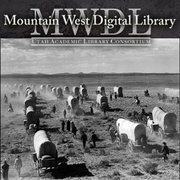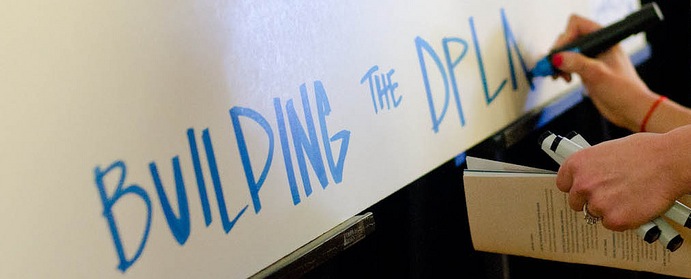Overview | Service Hubs | Content Hubs | Inquiries
 Digital Commonwealth
Digital Commonwealth
Digital Commonwealth is a Web portal and fee-based repository service for online cultural heritage materials held by Massachusetts libraries, museums, historical societies, and archives. The portal facilitates the searching and browsing of member institutions’ digital assets, allowing the discovery of all kinds of digital resources including manuscripts, images, historical documents, and sound recordings. The repository provides a storage service for institutions that are members of Digital Commonwealth but choose not to host their own digital assets. The metadata stored in the repository is indexed within the portal. Fifty organizations are members of Digital Commonwealth. As more of Digital Commonwealth members contribute their holdings, the variety and quantity of searchable objects will increase, and the richer and more valuable this portal will become. Currently Digital Commonwealth relies on support from its member institutions. Digital Commonwealth was initially funded by a federal Library Services and Technology Grant from the Institute of Museum and Library Services administered by the Massachusetts Board of Library Commissioners. The portal was designed by SourceLab.
For more information about partnering with Digital Commonwealth, please contact Tom Blake, Digital Projects Manager at the Boston Public Library, tblake(at)bpl(dot)org.
Read more about Digital Commonwealth in our Meet the Hubs! series
 Digital Library of Georgia
Digital Library of Georgia
The Digital Library of Georgia is a GALILEO initiative based at the University of Georgia Libraries that collaborates with Georgia’s Libraries, archives, museums, and other institutions of education and culture to provide access to digitized books, manuscripts, photographs, government documents, newspapers, maps, audio, video, and other resources about the history and culture of the state. The project hosts three portals: Digital Library of Georgia portal (http://dlg.galileo.usg.edu), the Civil Rights Digital Library (http://crdl.usg.edu), and Civil War in the American South (http://american-south.org/). The DLG portal connects user to a million digital objects in more than 200 collections from 60 institutions and 100 government agencies. The award-winning, IMLS-funded Civil Rights Digital Library features a collection of unedited news film from the WSB (Atlanta) and WALB (Albany, Ga.) television archives held by the Walter J. Brown Media Archives and Peabody Awards Collection at the University of Georgia Libraries and metadata for collections from over 150 institutions. The CRDL provides educator resources and contextual materials, including Freedom on Film, relating instructive stories and discussion questions from the Civil Rights Movement in Georgia, and the New Georgia Encyclopedia, delivering engaging online articles and multimedia. Civil War in the American South, a joint project with the Association of Southeastern Research Libraries (ASERL), provides a central portal to access digital collections from the Civil War Era (1850-1865) held by its members. Though these portals represent only a fraction of Georgia’s cultural treasures, the Digital Library of Georgia’s projects continue to grow through their partnerships with libraries, archives, museums, government agencies, and allied organizations across the state and nation.
For more information about partnering with the Digital Library of Georgia, please contact Sheila McAlister, Associate Director of the Digital Library of Georgia, mcalists(at)uga(dot)edu.
Read more about the Digital Library of Georgia in our Meet the Hubs! series
 Kentucky Digital Library
Kentucky Digital Library
In 1997, the Kentucky Virtual Library selected the University of Kentucky Libraries to build and manage the Kentucky Digital Library (KDL). UK Libraries manages the systems infrastructure for the digital library and creates and performs digital conversion of selected archival material from around the commonwealth. The infrastructure of the KDL has been re-engineered to insure a greater level of management over digital preservation and to safeguard the digital resources into the future. The Kentucky Digital Library is built to enhance scholarship, research and lifelong learning through the establishment of access to shared digital archival collections in the state of Kentucky. It also provides guidance and instruction for Kentucky libraries, archives, historical societies and museums on applying appropriate technologies used in the production of digital library resources. The Kentucky collaborative has strengthened over the last ten years with the Kentucky Digital Library experiencing continual growth since its inception. The KDL currently provides access to over 5,000 full- text archival finding aids representing 18 Kentucky archives. Additionally, there are 800,000 pages of newspapers. 300,000 pages of books, 110,000 photographs, 22,000 pages of archival material, 800 oral histories, 4,700 maps, and 200,000 pages from other paginated publications.
For more information about partnering with the KDL, please contact Mary Molinaro, Associate Dean for Library Technologies at the University of Kentucky Libraries, molinaro(at)uky(dot)edu.
Read more about the Kentucky Digital Library in our Meet the Hubs! series
 Minnesota Digital Library
Minnesota Digital Library
The Minnesota Digital Library is a ten-year old state-wide digital library collaboration consisting of Minitex, the University of Minnesota, the Minnesota Historical Society, and other key institutions. Through its own Minnesota Reflections database, the Minnesota Digital Library began making digitized content available in 2004. Today, Minnesota Reflections provides over 120,000 images, maps, and documents from nearly 150 of the state’s libraries and cultural heritage organizations. The Minnesota Digital Library has also developed activities and programs of community outreach, integration of digital cultural materials into K-12 curricula, professional development for library and museum staff and, more recently, planning and development of a digital preservation service. The MDL is funded by the Arts & Cultural Heritage Fund of the Clean Water, Land and Legacy Amendment to the Minnesota state constitution. Minitex is a joint program of the Minnesota Office of Higher Education and the University of Minnesota.
For more information about partnering with the Minnesota Digital Library, please contact John Butler, Associate University Librarian at the University of Minnesota, j-butl(at)umn(dot)edu.
Read more about the Minnesota Digital Library in our Meet the Hubs! series
 Mountain West Digital Library
Mountain West Digital Library
The Mountain West Digital Library is the regional digital collaboration in Utah, Nevada, southern Idaho, and Arizona, started by the Utah Academic Library Consortium in 2002. Partners include research libraries, public libraries, school libraries, museums, historical societies, municipalities, counties, state agencies, and other memory institutions throughout the Mountain West region. Through collaborative efforts among the partners, and through its network of more than twenty hosting centers, MWDL provides standards development, training in digital collection management, digitization services, hosting services, and metadata services. MWDL aggregates metadata from all collection partners into an open-access portal with powerful search features, at http://mwdl.org. Resources in a wide variety of media types and formats are available, including photographs, maps, artworks, books, newspapers, videos, Western sounds, oral histories, museum artifacts, educational materials, and scholarly publications.
For more information about partnering with MWDL, please contact Sandra McIntyre, Program Director, sandra(dot)mcintyre(at)utah(dot)edu.
Read more about the Mountain West Digital Library in our Meet the Hubs! series
 South Carolina Digital Library
South Carolina Digital Library
The South Carolina Digital Library (SCDL) currently hosts nearly 200,000 items of cultural and historical significance to the state contributed by over forty different institutions. The content available through the SCDL includes photographs, maps, books, manuscripts, newspapers, journals, glass plate negatives, audio recordings, and film. The contributing institutions include public libraries, museums, academic libraries, archives and historical associations. The web site allows for browsing the different collections, formats, topics, geographic locations, and institutions available. The SCDL began in 2007 as a collaborative effort between the University of South Carolina (USC), Clemson University, and the College of Charleston, with some additional funding from Library Services and Technology Act (LSTA) sub-grants. The SCDL has no central full time employees, but manages to add about 20,000 items from about nine institutions a year. USC, Clemson, and the College of Charleston operate regional scanning centers throughout the state. These three institutions, plus Georgetown Public Library, train other curators and librarians on scanning and metadata best practices and assist in bringing their collections online.
For more information on partnering with the SCDL, please contact Chris Vinson, Head of Digital Initiatives and Technology at the Clemson University Libraries, vinson(at)clemson(dot)edu.
Read more about the South Carolina Digital Library in our Meet the Hubs! series
